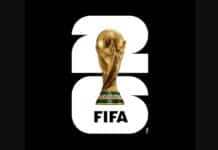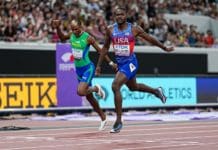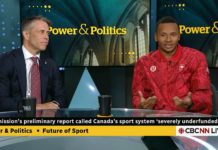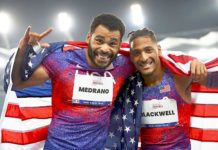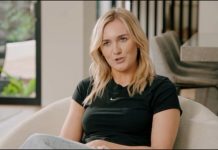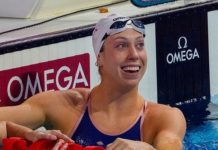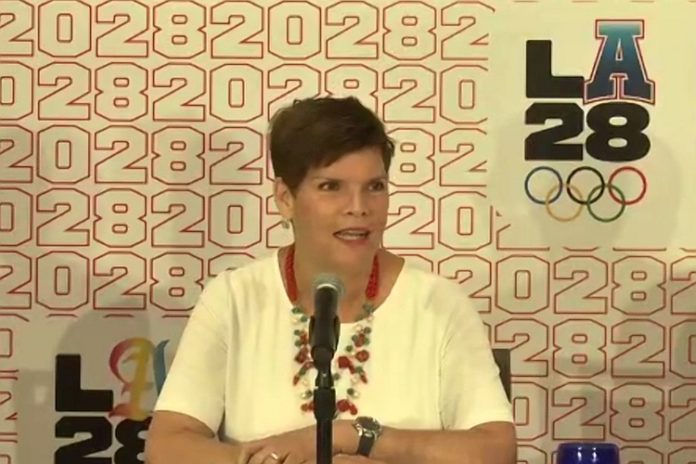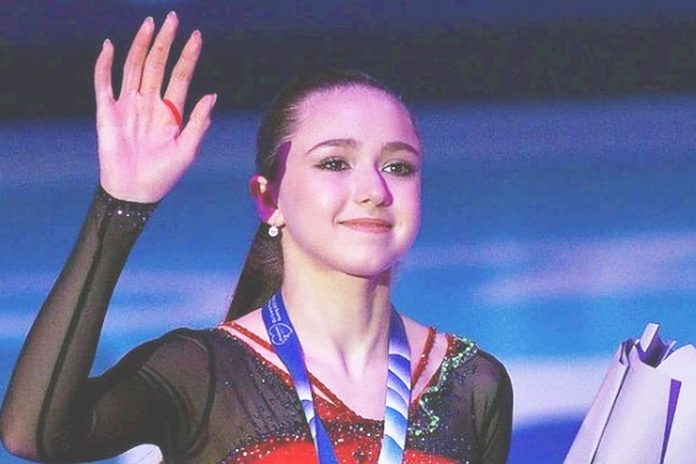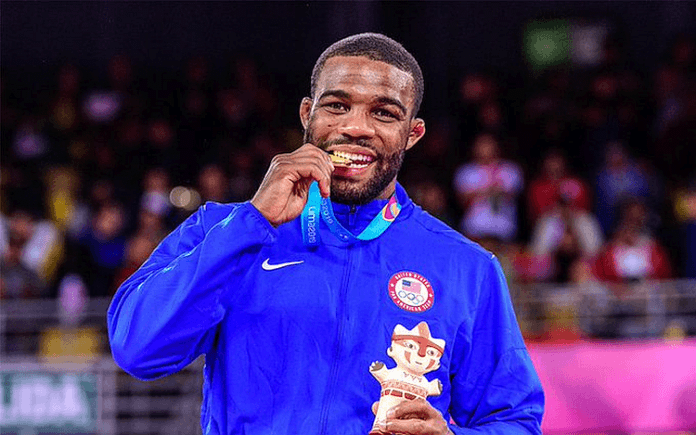★ The Sports Examiner: Surveying, monitoring and explaining the key competitive, economic and political forces shaping elite sport and the Olympic Movement. ★
★ To get The Sports Examiner by e-mail: sign up here! ★
≡ THE 5-RING CIRCUS ≡
1. USOPC Chair Lyons says “IOC beginning to think” about Russian return
2. Lyons on Salt Lake City: prefer 2034, ready for 2030
3. Hirshland: “we haven’t forgotten” 2022 Team figure skaters
4. IOC “very, very happy” with LA28 progress to date
5. Wasserman confident on sponsor revenue program for 2028
Back-to-back news conferences on Thursday by the U.S. Olympic & Paralympic Committee and the International Olympic Committee’s Coordination Commission for the 2028 Olympic Games in Los Angeles brought word that a return plan for Russian athletes is being considered, and that the preparations for the LA28 Games is going well. USOPC Chair Susanne Lyons confirmed the “preference” for Salt Lake City to be awarded the 2034 Olympic Winter Games, but that 2030 could work as well. LA28 Chair Casey Wasserman said the organizing committee is in a “strong position” with its revenue program and underscored the readiness of the already-built venues to host the 2028 Games. American wrestlers Tamyra Mensah-Stock and Amit Elor won golds at the UWW World Championships in Belgrade and 2016 Rio Olympic champ Helen Maroulis won silver as the American women finished second to Japan in the team standings.
1.
USOPC Chair Lyons says “IOC beginning to think”
about Russian return
“[T]his Olympic Movement is really built on the notion that athletes from around the world should be able to come together in peace and be able to compete with respect, equality and friendship. And we very much espouse that. That’s really the foundational reason why we have all of these athletes doing what they do.
“So, we know that the IOC is beginning to think about whether there is a pathway back for the Russian athletes. They are beginning to reach out to all of their stakeholders, including the NOCs, the International Federations to get input on that topic. So I don’t think any decisions have been made yet, but I think all of us feel that at some point in time, the individual athletes should not be the victims of whatever their individual governments [do, regardless of] political or other tensions are around the world.
“So, I think, inevitably, there will be a desire to see athletes who happen to reside in Russia, come back and be part of competitions, but what the timing is and what the pathway looks like is to be determined.”
That’s United States Olympic & Paralympic Committee Chair Susanne Lyons, speaking to reporters during a Thursday news conference following the USOPC Board meeting on Tuesday and Wednesday, with the first inkling that some movement toward Russian athlete re-admission to international competition is being discussed.
The International Olympic Committee asked all International Federations not to allow Russian or Belarusian athletes to compete in international events soon after the Russian invasion of Ukraine in February. But it has taken pains to emphasize that this was a “protective measure” to guarantee the safety of the competitors and integrity of the competitions and not a direct sanction against the Russian sports infrastructure. For example, the Russian Olympic Committee has not been suspended.
Asked about how Russian athlete reinstatement can be considered when American basketball star Brittney Griner is being imprisoned in Russia for “drug smuggling.” USOPC chief executive Sarah Hirshland explained:
“I think that while there may be a natural, sort of conflation of those issues, the reality is the conversation around Russian athletes is around how you actually separate, and try to avoid punishing Russian athletes for the decisions of the government. And I think that’s the motivation of conversation.
“But, it’s not lost on anyone in the United States that she’s there and it’s really very top-of-mind for all of us. So it’s hard not to conflate the issues and it’s hard not to bring them together, even though I think from a policy perspective, I’m not sure they are directly related.”
2.
Lyons on Salt Lake City: prefer 2034, ready for 2030
The question of the status of the Salt Lake City bid for the 2030 Olympic Winter Games and the recent postponement of the 2023 IOC Session in Mumbai (IND) was also raised, with Lyons largely reiterating prior comments:
“Our bid for Salt Lake City has looked at the possibility of either 2030 or 2034. That really hasn’t changed. As you know, there are some additional challenges with 2030 due to the proximity of the dates with L.A. [2028]. But as we have very clearly communicated to the IOC, if they need us in 2030, we will find a way to make that happen. So we’re very committed to whichever year that suits all the interested parties, including the global, overall Olympic Movement as a whole, and Paralympic Movement.
“So, does the moving of the [IOC Session] date really change much? it doesn’t change much for us, because I think our level of readiness is such that, if those conversations happen tomorrow vs. they happen six months from now, we’re pretty much in the same state of readiness that we need to be. It does give some of the other cities that are considering bids a little more time, I guess, to work through what they need to do.
“So we don’t really know what the impact will be. And, again, the delay for this meeting in Mumbai [India] has very little to do with the decision about bid cities. It has much more to do with some situations going on with the National Olympic Committee [of India].”
Asked about the USOPC’s stance on 2030 vs. 2034, she restated the current view:
“Because of the sponsorship and other commercial activities, it’s more complicated to try to do those two Games close together. And so we have stated a preference for 2034, but also stated that we believe that we have readiness to do 2030, if that was asked of us.
“I don’t think that has changed. I think our preference still would be to put a little bit more light in between those two Games, but again it remains to be seen how those awards will go.
“As you know, Salt Lake City is poised and ready, with their toes on the starting line, just waiting for someone to put off the gun.”
The other contenders are Sapporo in Japan and Vancounver (CAN), both prior hosts of successful Winter Games.
3.
Hirshland: “we haven’t forgotten” 2022 Team figure skaters
Hirshland was asked about the USOPC view of the announcement that the Russian Anti-Doping Agency had completed its inquiry into the doping positive of skater Kamila Valieva that has been holding up the awarding of the Team Event medals since February:
“I’d love to tell you that I’m less maddened or less frustrated, but you know better.
“It continues to be an outrageous situation. We knew, going in, that there was a guideline in the WADA Code that sort of allowed for this six-month time frame. …
“Our number one priority is to make sure that our Team USA athletes, who are sitting without their medals, know that we haven’t forgotten them. And so I do touch base with them from time to time, and say, ‘I wish I had more information, but I don’t want you to know we haven’t forgotten,’ and we are continuing to push and continuing to ensure that both WADA and the IOC share our focus and that we keep this top-of-mind for everybody so that we’re doing everything we can to push the process, to try to come to a resolution, and, ultimately, to ensure that these athletes do get as much a moment in the sun as we can possibly create for them, given the circumstances.
“At this point, that’s where we are. We’re going to continue to do that. We’re going to send the message that none of us have forgotten that this is very much out there and unresolved and they deserve our love and attention and they deserve a celebration of their achievement. And we are continuing to endure that the process is happening against the guidelines and standards for the process.
“The bad news is, there can be hearings, and then, of course, there can be appeals, so as I said to you before, I fear this is going to linger for quite some time.”
4.
IOC “very, very happy” with LA28 progress to date
The third IOC Coordination Commission meeting for the Los Angeles 2028 Games concluded with a 40-minute news conference on Thursday, with Chair Nicole Hoevertsz – who competed at the Los Angeles 1984 Games as an artistic swimmer for Aruba – declaring:
“L.A. is an amazing place. The Games are going to be amazing, and the venues are amazing. So, in general, we are very, very happy, about this CoComm [meeting].
“The venues that are going to be used are actually a mix – and that’s so beautiful – of the historic venues that were used in 1932 and 1984 Olympic Games, and of course, we have world-class, modern venues that were built since the Games took place in 1984, so we have this beautiful mix of the old and the new, and the CoComm was actually very excited to be visiting the venues.
“We also saw a lot of beautiful projects with kids, that is one of the things that I want to talk about. The PlayLA program is actually fantastic, $160 million that the IOC and [LA28] are investing in these youth sports programs, and we saw them first-hand. …
“We saw a number of sports and we saw how the [2028] Games are already creating a legacy way ahead of the Games. That was so beautiful to see. When we talk about legacy, people always think about, ‘well, that happens after the Games are over.’ But that’s not true. We could see here, in the City of L.A. how a youth program – PlayLA – is already creating legacy now, today, for these kids.”
Hoevertsz didn’t stop there, commending the still-small LA28 organizing committee, now with about 130 people on staff, led by Chair Casey Wasserman:
“We saw great energy on the organizing committee. I cannot stop to congratulate you on the wonderful team you have assembled, that you are assembling. The best in the world, I would say, is really working on the L.A. Olympic Games. Wonderful people, young people, a lot of athletes and that’s wonderful, a lot of Olympians and Paralympians. We like that, that natural mix and we find it very important as you all know. The city of L.A. and the USA is going to be hosting, for the first time, the Paralympic Games and for us, that’s very important as well. …
“The Commission members were very pleased, were very impressed, impressed with the progress, impressed with the optimism that is really so clear to sense, to feel from the organizing committee. So we are very happy with what we saw these days and looking forward with great optimism.”
Said Wasserman:
“We are on track to host an incredible Olympic and Paralympic Games. …
“In short, the Olympics and the Paralympics are the biggest events on earth, and we think the City of Los Angeles is the perfect partner to host those Games.
“As we have said from the very beginning, our model is very different. We’re fortunate to have incredible venues, incredible facilities all over the city, and as such, we’re going to host a Games using those facilities for about 45 days in the summer of 2028 and turn them back over to their owners and their operators so they can return to their existing use.
“L.A. Live, SoFi Stadium, the Coliseum, Banc of California [Stadium], Dignity Health [Sports Center], USC and UCLA were visited by the Coordination Commission, and I think the ability to see those venues up close, in person, understand the level at which they operate, the competitiveness of the marketplace which requires them to be excellent, the passion and the commitment of their operators and their owners to not just the Olympics, but to every day make sure that they are the best venues on earth, really prove the point that we are Games-ready, our venues are ready, and the Games are going to be well taken care of, from the athletes on up when they arrive in 2028.
“We have no permanent new construction. Obviously, there will be some temporary venues, but we are ready to host the Games. Our venues are more than capable. L.A. is in the events business. We are one of the tourism capitals of the world. We host big events all the time. … that’s what we do here and that’s why we are proceeding with such great excitement and confidence. …
“Truthfully, the secret of our Games plan is USC and UCLA. There is no city on earth that has two universities at [their] scale, with athletic programs and student bodies of the size they are, that are in the city center, 10 miles from each other. And that truly is, the heart of the Olympic Games in Los Angeles. … We are well positioned for an exceptional event, and we’re excited for 2028.”
Asked about the continuing process of finalizing sports and venues, Wasserman noted the remarkable flexibility afforded LA28 by the availability of facilities:
“Not every city has a venue like Intuit Dome being built [in Inglewood] that didn’t exist when we bid, and so our goal is to be responsible and adaptive to a city that’s ever changing, and that includes venues. So, obviously, one of the considerations for sports is where are they going to be and how are they going to fit into the venues that we have, and that’s obviously a part of our plan.”
One venue which has changed is for canoeing and rowing, moved from Lake Perris to the Long Beach Marine Stadium, albeit with a shorter-than-normal course for rowing of 1,500 m (vs. 2,000 m). The IOC Olympic Games Executive Director Christophe Dubi (SUI) noted the process of approval is ongoing, but the athlete impact was especially important to remember:
“What we’re heard from the president of the rowing federation, they are very happy to move to a shorter course. We have to go through the motions and the process for the validation of the venue itself going through the Coordination Commission, formally, the Executive Board.
“But what we’ve heard out of the rowing community is that for the benefit of being in the center of the Games, downtown south, we can change the length of the course. And guess what, this is a formidable opportunity and very good news indeed.”
5.
Wasserman confident on sponsor revenue program for 2028
Wasserman was specifically asked about the LA28 revenue production program, especially in light of the budget pressures on the Paris 2024 and Milan Cortina 2026 organizing committees from modest domestic sponsor funding and the impact of inflation. He was confident:
“We’re an organizing committee, but we’re a commercial organization, and we have our finger very clearly focused on revenue generation, and I can assure that our job is to align those expenses with the revenue, we think and we’re going to generate, and already have generated. And the IOC has been great partners in understanding that we’re going to have to be adaptable if the world changes.
“The one thing we can’t predict is the world we’re going to be in. The one thing we can control is how we operate and we’re very focused on that and we think that puts us in a very strong position.”
Asked for specifics on the domestic sponsorship sales so far, Wasserman noted:
“Obviously, we’ve got several significant deals already signed, with Delta – who was our first partner – and they’ve been incredible, and Salesforce and Comcast, sort-of second-tier deals with Nike and Ralph Lauren and Deloitte, Hershey and others. Obviously, just announced, our big deal with Fanatics, our significant deal with On Location, who has been a great partner not just to us, but to Paris and Milan and the three Games together as a first-time, sort of global hospitality solution, which is significant. Obviously, our deal with NBCUniversal adds a great underpinning to our success.
“And so, we sit in a very strong position. Obviously, the world is the one we operate in; sports continues to be the shining light. Sports is predictable and unique, in a world where very little else is, and the Olympic Games will command the world for 17 days and our job is to tell that story to brands and understand that the biggest event, the most inclusive and powerful event on earth is one of the most important cities in the world to speak from is an incredible opportunity to partner in.
“And we’ve had great success, and would say, stay tuned, we’ve got announcements coming in the fourth quarter of more partnerships. Obviously, the good thing is there’s lot of sports sponsorships being done and being handled; it’s not that we’re the only one in the marketplace, and the appetite for the Games coming back to this country is very strong.”
Hoevertsz was even more positive about future prospects:
“I’ve said it before and I’ll say it again, the United States of America and in particular, California and in particular, the city of L.A. is a unique market. We are very, very aware of that and we are very pleased by everything that has happening as outlined by Casey just now. …
“Each city has different goals, has different aspirations. The aspirations of the city of L.A. are unique because they are privately funded, completely. I mean there is not one other city that I think that could do that. And that’s what we’re benefitting from. It’s something that we are very proud of, and we want, therefore, the Games of 2028, to be so strong for the athletes because we think that as the Games were unique from 1984, they will again be unique for 2028.”
≡ WORLD CHAMPIONSHIPS ≡
● Gymnastics ● Italy’s 18-year-old Sofia Raffaeli continued her march through the FIG Rhythmic Gymnastics Championships in Sofia (BUL) with a third gold in the individual apparatus finals.
Raffaeli won the Ribbon title, scoring 32.650, with the highest degree of difficulty (15.600) to out-score Stiliana Nikolova (BUL: 31.850) and Ekaterina Vedeneeva (SLO: 29.900).
Germany’s Darja Varfolomeev won with Clubs, scoring 33.550 to best Nikolova (32.600) and Raffaeli (31.850). In the four individual apparatus event, Raffaeli won medals in all four (3-0-1), while Nikolova and Varfolomeev won three each.
The top 18 finishers in the combined apparatus scores qualified for the All-Around, with Raffaeli again the leader at 98.850, ahead of Nikolova (98.200) and Varfolomeev (96.050).
● Wrestling ● U.S. women scored two golds and a silver on the final day of the women’s Freestyle at the UWW World Championships in Belgrade (SRB) and finished second to Japan in the women’s team standings.
Tokyo Olympic champ Tamyra Mensah-Stock won her third Worlds gold at 68 kg, defeating Amy Ishii of Japan in the final by pinfall in just 2:10 after piling up a 6-0 lead. In her four bouts, she pinned two opponents and piled up a cumulative score of 36-0!
At 72 kg, 18-year-old Amit Elor added to her 2022 World Junior Championship gold with the world title! After a 10-0 technical fall win in her first bout, she pinned Turkey’s Buse Tosun, then out-fought Japan’s Masako Furuichi, 3-2. In the final, she overwhelmed Zhamila Bakbergenova (KAZ) in a 10-0 technical fall victory. Wow!
Three-time World Champion Helen Maroulis had to settle for silver at 57 kg, losing to Japan’s Tsugumi Sakurai, 3-0, in a tense bout with only one takedown. Maroulis won her sixth Worlds medal (3-2-1) over eight years in addition to an Olympic gold in 2016 and bronze at Tokyo 2020.
Anastasia Nichita’s win for Moldova at 59 kg was one of only two women’s classes that was not won by a U.S. or Japanese wrestler. She defeated Grace Bullen of Norway in the final by 4-1.
Japan won the team title for the 17th time in the 20 World Championships held this century, 190-157 over the U.S., with China third (84). American women won seven total medals (3-2-2), equaling the most ever, also by the 2003 and 2021 teams.
Competition continues in the men’s Freestyle division through Sunday.
≡ PANORAMA ≡
● Olympic Winter Games 2026: Milan Cortina ● The organizing committee announced the signing of the Italian office of the staffing giant Randstad as its second domestic sponsor.
This is good news for the beleaguered Milan Cortina organizers, considered to be making too-slow progress on the domestic marketing front. It announced its first deal, with Italian supermarket operator Esselunga in July.
● NBC ● The U.S. broadcaster for the Olympic Games will close its round-the-clock cable Olympic Channel at the end of September, but will introduce a monthly, one-hour program this Sunday called “Chasing Gold: Paris 2024.”
The first show will debut on NBC on Sunday at 2:30 p.m. Eastern time, amid live NFL coverage on CBS and FOX. The show, hosted by Mike Tirico and Maria Taylor, will be available the next day on the Peacock streaming service.
● Figure Skating ● History for American teen Ilia Malinin:
“ISU World Junior Figure Skating Champion Ilia Malinin (USA) jumped into sports history by landing the first quadruple Axel in competition at the U.S. International Classic in Lake Placid (USA) on September 14, 2022.
“The 17-year-old added the last missing jump to the quad arsenal – now all of the Figure Skating jumps Axel, Lutz, flip, loop, Salchow and toeloop have been performed as quadruples in an official ISU sanctioned competition. As the Axel is the only jump with a forward take-off, a quadruple has actually four and a half revolutions.”
The quad Axel has been pursued by stars such as two-time Olympic champ Yuzuru Hanyu (JPN), and Malinin credited Hanyu’s attempts as his inspiration. Still 17, Malinin was born in Virginia to Russian-born Uzbekistani skaters Tatiana Malinina and Roman Skorniakov, and reportedly is using his mother’s surname “due to his parents’ concerns that his father’s surname would be too difficult to pronounce.”
He finished ninth in the 2022 World Championships, his first appearance at the senior-level Worlds.
¶
You can receive our exclusive TSX Report by e-mail by clicking here. You can also refer a friend by clicking here, and can donate here to keep this site going.
For our updated, 620-event International Sports Calendar for 2022 and beyond, by date and by sport, click here!







